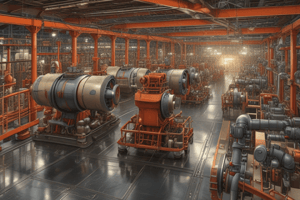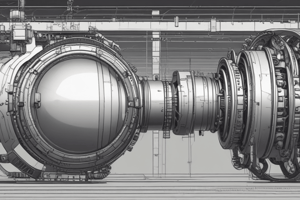Podcast
Questions and Answers
What significant event marked the transition to mechanized production in engineering?
What significant event marked the transition to mechanized production in engineering?
- The Industrial Revolution (correct)
- The invention of the transistor
- The rise of environmental engineering
- The founding of engineering institutions
Which type of engineering was primarily driven by the need to address environmental issues?
Which type of engineering was primarily driven by the need to address environmental issues?
- Mechanical Engineering
- Civil Engineering
- Architectural Engineering
- Environmental Engineering (correct)
In which century did the development of the transistor revolutionize electronics and lead to the computer age?
In which century did the development of the transistor revolutionize electronics and lead to the computer age?
- 19th Century
- Mid to Late 20th Century (correct)
- Late 18th Century
- 21st Century
Which engineering discipline focuses on the design and maintenance of transportation and infrastructure?
Which engineering discipline focuses on the design and maintenance of transportation and infrastructure?
What major societal transformation occurred at the turn of the 21st Century in engineering?
What major societal transformation occurred at the turn of the 21st Century in engineering?
What is a primary goal of modern engineering in addressing complex challenges?
What is a primary goal of modern engineering in addressing complex challenges?
Which of the following areas is NOT typically a focus of engineers in the context of sustainable infrastructure?
Which of the following areas is NOT typically a focus of engineers in the context of sustainable infrastructure?
Which aspect of modern engineering encompasses collaboration across borders?
Which aspect of modern engineering encompasses collaboration across borders?
In the context of ethical responsibility, what is emphasized by modern engineers?
In the context of ethical responsibility, what is emphasized by modern engineers?
What is an essential characteristic of modern engineering when it comes to system design?
What is an essential characteristic of modern engineering when it comes to system design?
Flashcards are hidden until you start studying
Study Notes
Modern Engineering Overview
- Modern engineering applies scientific principles and advanced technology to create and maintain complex systems and structures.
Historical Context
- The Industrial Revolution marked the rise of mechanical engineering, automating manufacturing processes.
- Civil engineering advanced alongside the demand for transport and infrastructure.
- Establishment of engineering societies in the late 18th century solidified engineering as a professional field.
Engineering Disciplines in the 19th Century
- Civil Engineering: Focused on infrastructure development.
- Mechanical Engineering: Involved in machinery design and automation.
- Electrical Engineering: Emerged with advancements in electrical systems.
- Chemical Engineering: Centered on chemical processes and production.
- Architectural Engineering: Combined architecture with engineering principles.
- Environmental Engineering: Addressed ecological concerns.
- Biomedical Engineering: Integrated technology with healthcare.
- Aerospace Engineering: Focused on aircraft and spacecraft design.
Technological Revolution (Mid to Late 20th Century)
- The invention of the transistor in 1947 and integrated circuits in 1958 kickstarted the computer age, changing electronics.
- Environmental awareness led to the emergence of environmental engineering, targeting pollution and sustainability issues.
21st Century Engineering Trends
- Digital technology has transformed industries through the internet, mobile computing, and artificial intelligence.
- A focus on developing renewable energy sources like solar and wind power is essential for combating climate change.
Goals of Modern Engineering
- Design innovative solutions to tackle complex societal challenges while enhancing quality of life.
- Address sustainability through the development of eco-friendly technologies and infrastructures.
Ambitions in Modern Engineering
- Problem-Solving: Engineers analyze and resolve real-world issues in various sectors.
- Innovation: Striving to create cutting-edge technologies and materials.
- Sustainability: Designing products and systems that minimize environmental impact.
- Safety and Reliability: Ensuring engineered structures can endure diverse conditions.
- Efficiency and Optimization: Aiming for effective processes with minimal resource waste.
- Ethical Responsibility: Prioritizing the welfare of society and considering the impacts of engineering decisions.
- Global Collaboration: Engineers work together internationally to solve pressing global issues such as pandemics and energy shortages.
Studying That Suits You
Use AI to generate personalized quizzes and flashcards to suit your learning preferences.





